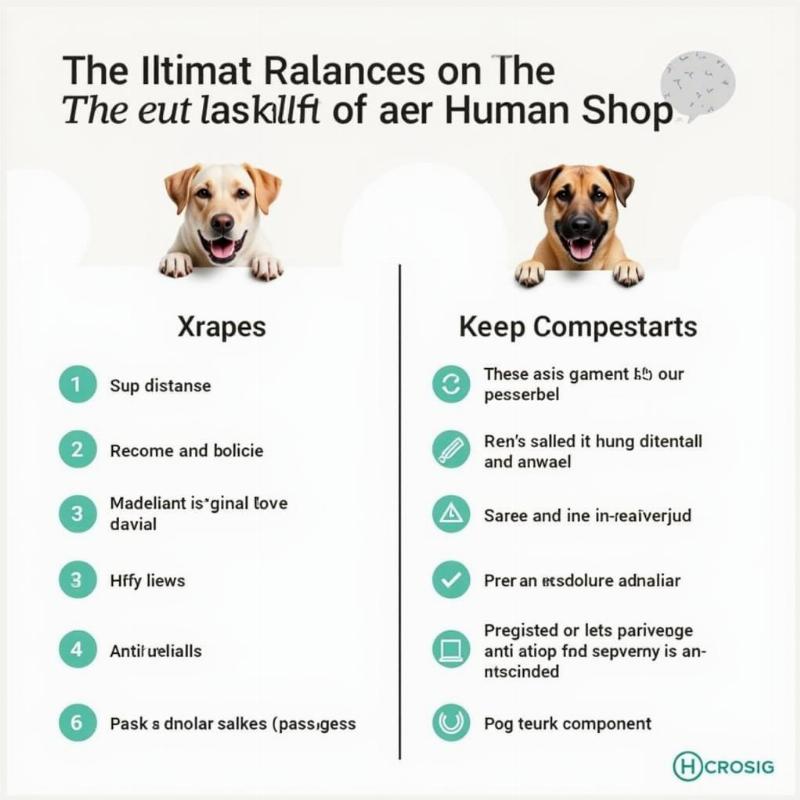The age-old question, “Is a dog’s mouth cleaner than a human’s?” often sparks debate among pet owners. While the image of a dog licking a wound might suggest inherent cleansing properties, the truth is more nuanced. A dog’s mouth, like a human’s, teems with bacteria, though the types of bacteria differ. Understanding this difference is key to accurately assessing the cleanliness of a canine’s kiss.
Exploring the Canine Oral Microbiome
A dog’s mouth hosts a diverse community of bacteria, forming its unique oral microbiome. This microbiome, while different from a human’s, doesn’t necessarily equate to cleaner or dirtier. Instead, it reflects the specific environment and diet of the dog. Certain bacteria found in a dog’s mouth can be zoonotic, meaning they can be transmitted to humans and cause illness. Conversely, human saliva also contains bacteria that can be harmful to dogs.
Comparing Dog and Human Saliva
The composition of saliva, both in dogs and humans, plays a role in oral hygiene. Human saliva contains enzymes like lysozyme, known for its antibacterial properties. While dogs also possess lysozyme, the concentrations and specific functions may differ. Furthermore, the pH levels of saliva vary between species, influencing the growth and survival of different bacteria.
 Comparing Dog and Human Saliva
Comparing Dog and Human Saliva
Debunking the Myth of the “Healing Lick”
While anecdotal evidence suggests dogs instinctively lick wounds to promote healing, the scientific community remains divided on this. While saliva may contain certain growth factors that could aid in the healing process, the risk of introducing harmful bacteria outweighs any potential benefits. In fact, a dog’s lick can introduce bacteria that could lead to infection, complicating the healing process. It’s crucial to seek veterinary care for any wound, rather than relying on a dog’s “healing lick.”
Factors Influencing Canine Oral Hygiene
Just like in humans, a dog’s oral hygiene is influenced by several factors including diet, breed predisposition, and regular dental care. Feeding your dog a balanced diet, providing appropriate chew toys, and adhering to a regular dental cleaning schedule recommended by your veterinarian can significantly contribute to a healthier mouth.
Conclusion: Focusing on Responsible Pet Care
While a definitive answer to “Is a dog’s mouth cleaner than a human’s?” remains elusive, understanding the complexities of the canine oral microbiome is crucial. Instead of focusing on comparative cleanliness, prioritizing responsible pet care through regular veterinary check-ups, proper dental hygiene, and a healthy diet will ensure your dog’s mouth, and yours, remain as healthy as possible. Remember, regular veterinary visits are key to maintaining your dog’s overall health.
FAQ
- Can I let my dog lick my face? While it’s a personal choice, it’s generally not recommended due to the potential transfer of bacteria.
- How often should I brush my dog’s teeth? Ideally, daily brushing is recommended. Consult with your veterinarian for personalized advice.
- What are signs of dental problems in dogs? Bad breath, excessive drooling, difficulty eating, and swollen gums can indicate dental issues.
- Are there special toothpastes for dogs? Yes, never use human toothpaste on dogs as it can be harmful.
- What are some good dental chews for dogs? Look for Veterinary Oral Health Council (VOHC) approved products.
- Can dogs get cavities? Yes, just like humans, dogs can develop cavities.
- Is anesthesia always required for dog dental cleanings? While general anesthesia is often recommended for thorough cleaning, some veterinarians offer anesthesia-free options for certain cases.
indoor dog park charlotte nc
what shots do dogs need for boarding
can dogs get rabies with vaccine
shot clinics for dogs in albuquerque
Beautdogs.us is your premier online resource for comprehensive dog care information, breed-specific guidance, and access to the best products and services for your canine companion. We’re committed to providing expert advice for both new and experienced dog owners across the USA, ensuring the health and happiness of your furry friend. Contact us today for any questions or concerns about your dog’s health and wellbeing. Email: [email protected], Phone: +1 501-555-7529. Visit Beautdogs.us to learn more.